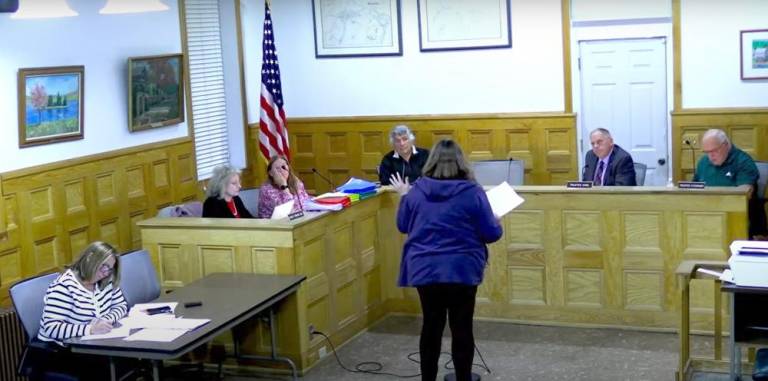More parking kiosks coming to Monroe
Monroe. Parks & Rec Commission chair discusses budget issues, field use.

The Monroe Village Board approved the purchase of two additional parking payment kiosks at a total cost of about $15,336 to be located on Lakes Road, at the October 15 meeting. Before the decision was made, Trustee John Karl questioned how well the other kiosks were working out for the village and why the board must spend more on additional kiosks when the company who sold them told the board the number that was needed.
Trustee Andrew Ferraro, who led the meeting in Mayor Neil Dwyer’s absence, read a text from the mayor that said 14 kiosks were recommended and the village ordered 10 to determine the location and coverage area. After this initial review, it was determined that another two kiosks were needed.
Ferraro also shared that he heard little complaint about the kiosks, however, at least one resident, who spoke during public comment, is not a fan of the new system.
The resident claimed that the addition of parking kiosks on Millpond Parkway has caused more people to park in the free areas near the movie theater and up Smithfield Court. She also noted that one kiosk replaced the three free spots by the library in addition to the meters. The resident said she and others were not averse to paying for parking, they were just against paying for it via the kiosks, which requires the use of an app that might be challenging for many people. She also claimed that the signage informing drivers about the kiosks was inefficient, noting that they are often far from the parking spots, leading people to assume that those are free spaces.
The resident further argued that limiting free parking discouraged foot traffic to businesses in the area and wondered why it was limited to just the Christmas holiday season. She also wondered about the economic advantage of having paid parking and whether the maintenance and enforcement of the kiosks were a good investment for the village. She asked the board if they would consider selling parking passes as an alternative.
Ferraro responded that the kiosks were working, claiming that before the kiosks were installed and the meters were removed, the spots close to the various businesses in the area were filled all day, often by their owners or employees. “The main thing is just to keep things flowing so there is parking downtown so you see a parking spot you can go in you pay, go do what you got to do you get your car and you go home.”
Ferraro agreed that better education on using the kiosks might be helpful and suggested the board review sending out information to Monroe residents.
Parks & Rec
Chris Sullivan, chairman of the Monroe Joint Parks and Recreation Commission, addressed budgetary concerns with the board. The board asked if the $18,000 allotted for seasonal personnel services was sufficient to cover the needs of Smith Clove Park. Sullivan agreed, saying that the commission has considered hiring a fourth full-time maintenance position to ensure that at least one employee could be out at the park every day.
Sullivan addressed questions regarding the $10,000 insurance budget line item, saying that he believed some of the equipment was covered under the village’s policy and that they had their own insurance for the fields.
The joint parks chair also responded to questions about the ability to expand one of the fields by relocating one of the roads within Smith Clove Park. He said that some material would have to be moved and that it’s something to investigate.
Sullivan sought to clarify misunderstandings about field use, informing the board that it was never determined on a first come, first serve basis. He explained that the park has had leagues that have been using the fields for more than 30 years and are grandfathered in, adding that newer leagues have come in that do not benefit from the protocols in place for older leagues. Sullivan further shared that the commission does not permit secondary leagues from using the fields, meaning that if there is already a football league, for example, the commission will not approve another one to use the fields. He explained that limiting the number of leagues that can use the fields ensures that the public has sufficient access to them and limits wear and tear.
Sullivan responded to questions about how the fields were used, noting that the teams rotate use of the top field and the main field at Smith Clove Park. He also said that teams will change where they practice on a particular field so as not to wear it down too quickly.